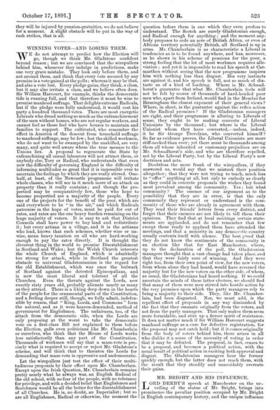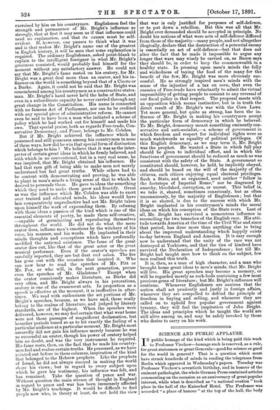MR. BRIGHT AND HIS INFLUENCE.
TORD DERBY'S speech at Manchester on the ue- veiling of the statue of Mr. Bright, brings into prominence the peculiar position occupied by Mr. Bright in English contemporary history, and the unique influence exercised by him on his countrymen. Englishmen feel the strength and permanence of Mr. Bright's influence so strongly, that at first it may seem as if that influence could need no explanation, and that its causes must be self- evident. If, however, one pauses to think what it was and is that makes Mr. Bright's name one of the greatest in English history, it will be seen that some explanation is required. The ordinary Englishman, asked point-blank to explain to the intelligent foreigner in what Mr. Bright's greatness consisted, would probably find himself for the moment without any satisfactory answer. He could not say that Mr. Bright's fame rested on his oratory, for Mr. Bright was a great deal more than an orator, and his in- fluence on the world is something beyond that of a Cicero or a Burke. Again, it could not be said that Mr. Bright was remembered among his countrymen as a constructive states- man. Mr. Bright's hand never held the helm of State, and even in a subordinate capacity he never carried through any great change in the Constitution. His name is connected with no famous Act of Parliament, nor can he be credited with any special piece of administrative reform. He cannot even be said to have been a man who initiated a scheme of policy which he had worked out for himself and made his own. That special praise, both as regards Free-trade, Con- servative Democracy, and Peace, belongs to Mr. Cobden. But if Mr. Bright achieved the influence which he possessed and still possesses among his countrymen in none of these ways, how did he win that special form of distinction which belongs to him ? We believe that it was as the inter- preter of certain great ideas in which he firmly believed, and with which in no conventional, but in a very real sense, he was inspired, that Mr. Bright obtained his influence. He had that rare gift of being able to make men not merely understand but feel great truths. While others had to be content with demonstrating and proving, he was able to plant in men's minds a living sense of that to which he desired to persuade them. He gave to ideas the something which they need to make them grow and fructify. Great as was the influence which Mr. Cobden was able to exert over trained and educated minds, his ideas would have lain comparatively unproductive had not Mr. Bright taken upon himself the work of expounding them. By infusing with those ideas a passion of the kind which is one of the essential elements of poetry, he made them self-creative, —capable of germinating and reproducing themselves throughout the world. He did not do what the mere orator does, inflame men's emotions by the witchery of his voice, his manner, and his words. He implanted in their minds thoughts and conceptions which have profoundly modified the national existence. The fame of the great orator dies out, like that of the great actor or the great musical performer. Even if the orator's speeches are carefully reported, they are but dust and ashes. The fire has gone out with the occasion that inspired it. Who can now bear to read the speeches of Mr. Pitt or Mr. Fox, or who will, in the next generation, peruse even the speeches of Mr. Gladstone ? Except when the orator consciously makes literature, as Burke did very often, and Mr. Bright always in his perorations, oratory is one of the evanescent arts. In proportion as a speech is effective at the moment, it is ineffective in after- times. We read with enthusiasm the set portions of Mr. Bright's speeches, because, as we have said, these really belong to the realms of literature, and judged by literary standards, are of the highest. When the speeches were delivered, however, we may feel certain that what went home were not those passages of magnificent declamation, but homelier periods tuned so as to hit exactly the feeling of a particular audience at a particular moment. Mr. Bright most assuredly did not gain his influence merely because he was so successful an orator, though his power of oratory helped him no doubt, and was the very instrument he required. His fame rests, then, on the fact that he made his country- men feel and realise certain truths. He possessed, as we have pointed out before in these columns, inspiration of the kind that belonged to the Hebrew prophets. Like the prophets of Israel, he did not always succeed in making the world share his views ; but in regard to every subject upon which he gave his testimony, his influence was felt, and has remained. Take the question of peace and war. Without question the main stream of thought in England in regard to peace and war has been immensely affected by Mr. Bright's teachings. It would be difficult to find people now who, in theory at least, do not hold the view that war is only justified for purposes of self-defence, or to put down a rebellion. But this was all that Mr. Bright ever demanded should be accepted in principle. No doubt his notions of what were acts of self-defence differed from those of the majority—many people, and not altogether illogically, declare that the destruction of a potential enemy is essentially an act of self-defence—but that does not alter the fact that he made it impossible to argue any longer that wars may wisely be carried on, as Bacon says they should be, in order to keep the commonwealth in a healthy state. In pressing upon men's minds the folly and wickedness of taxing the food of the many for the benefit of the few, Mr. Bright was more obviously suc- cessful. He so strongly inspired men's minds with the sense of the injustice of a tax on corn, that even the enemies of Free-trade have reluctantly to admit the virtual impossibility of getting people to consent to any reversal of our fiscal policy in that respect. The proposal meets with an opposition which seems instinctive, but is in truth the direct result of Mr. Bright's war with the Corn Laws. Yet more general, but quite as strong, has been the in- fluence of Mr. Bright in making his countrymen accept the particular form of democracy in which he believed. To Mr. Bright, democracy meant something eminently con- servative and anti-socialist,—a scheme of government in which freedom and respect for individual rights were as much watchwords as equality of political privileges. Of this English democracy, as we may term it, Mr. Bright was the prophet. He wanted a State in which full play should be given to individual effort, and in which the functions of government should be reduced as much as was consistent with the safety of the State. A government so constituted should, however, he held, be implicitly obeyed, and should be based on the will of the majority of the citizens, each citizen enjoying equal electoral privileges. Such a State, and so organised, need neither " follow in the footsteps of Imperial Rome," nor be disgraced by anarchy, bloodshed, corruption, or unrest. This belief is, we take it, shared, sometimes consciously, but as often unconsciously, by the majority of Englishmen ; but that it is so shared, is due to the success with which Mr. Bright implanted in his countrymen's minds the moral ideas on which his conception of the State rests. Last of all, Mr. Bright has exercised a momentous influence in reconciling the two branches of the English race. His atti- tude towards America, at the time of the Civil War and since that period, has done more than anything else to bring about the improved understanding which happily exists to-day between England and America. It is easy enough now to understand that the unity of the race was not destroyed at Yorktown, and that the ties of kindred have survived the Declaration of Independence ; but till Mr. Bright had taught men how to think on the subject, few men realised this truth.
It is, then, as a man of high character, and a man who brought home great ideas to men's minds, that Mr. Bright will live. His great speeches may become a memory, or will be regarded merely as rock-beds containing a few most precious gems of literature ; but Mr. Bright's influence will continue. Whenever Englishmen are anxious that the nation shall act prudently and justly in foreign affairs, whenever they are compelled to defend the principle of freedom in buying and selling, and whenever they are called on to uphold free popular government against tyranny, they will feel the inspiration of John Bright. The ideas and principles which he taught the world are still alive among us, and may be safely invoked by those who desire to carry on his work.



































 Previous page
Previous page